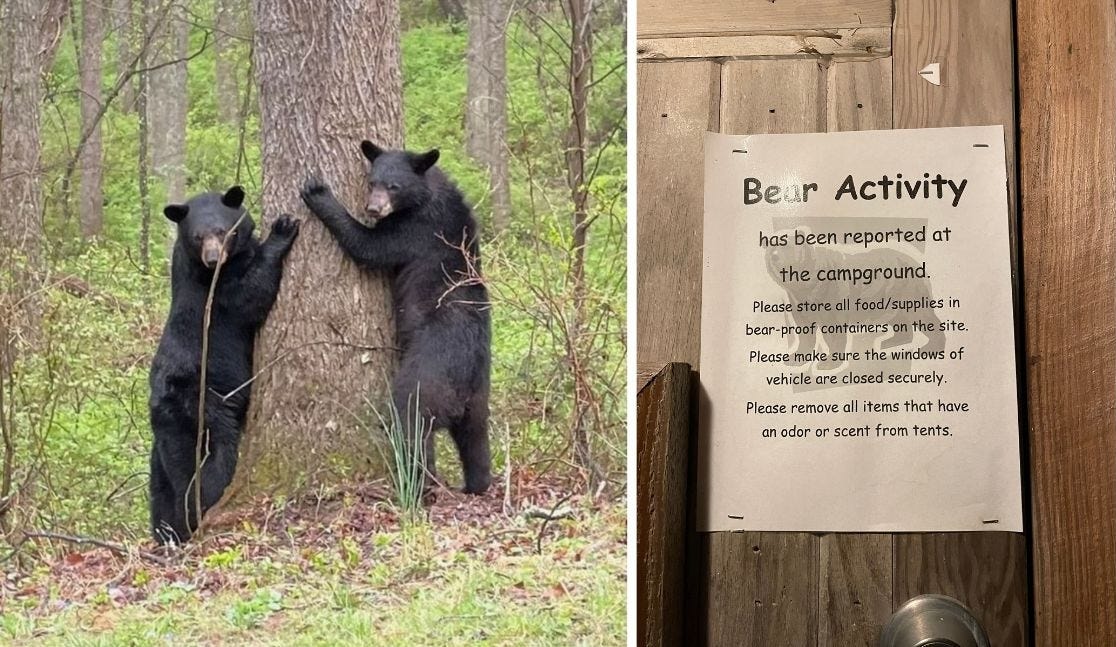Full water restoration is weeks away
Plus: Missing person count decreases; About 1,600 customers without power; More Blue Ridge Parkway sections open; Bear activity expected to increase; ‘Miracle cat’ returns home
You’re reading Mountain Updates, a free pop-up newsletter from The Charlotte Ledger examining the crisis and recovery in the N.C. mountains. Ledger subscribers can add Mountain Updates on their “My Account” page.
Sign up for free:
Five weeks later, flushing toilets is about the only thing thousands of Western North Carolinians can safely do with the water in their pipes. In Spruce Pine, that’s a luxury residents still don’t have thanks to the town’s inoperable water treatment plant.
Clean, running water is taken for granted until it’s no longer there. Yesterday was my father’s birthday, and my parents had to drive 50 minutes to find a restaurant that served ice in its drinks. My mother bought a frozen cheesecake from Trader Joe’s because she didn’t want to waste their limited water jug supply on washing all of the dishes needed to make a birthday cake.
Afterward, they took showers with a camping shower from REI, in which they had to boil water to mix with room temperature water to take a 3-minute, low-pressure shower. They drive to Charlotte almost every weekend to do laundry and fill up gallon water jugs at my apartment.
It’s not ideal, but they’re making do, like thousands of others. The true frustration comes from not knowing when the water situation will be back to normal. For many in Buncombe County, they’re predicting a minimum of two to three weeks.
This week, Asheville's Water Resources Department completed a treatment process for the North Fork Reservoir in Black Mountain, aiming to reduce the sediment in the water. The city’s water system supports about 160,000 people in Buncombe and Henderson counties.
If the treatment is successful, a flushing plan to restore potable water could start as soon as next week, WLOS reported. If that’s successful, then a third round of water treatment will begin.
In the Mitchell County town of Spruce Pine, officials are working to restore potable water to one of its main wastewater treatment facilities that was destroyed in the hurricane. The wastewater is going right into streams and rivers so its 15,000 residents are being told to avoid flushing toilets, the Asheville Citizen Times reported. The timeline for repairs is still unknown.
Let’s catch up with the rest of the region:
Power update: It’s been a while since we checked on the power situation. According to ReadyNC.gov, more than 1,600 customers in Western North Carolina are without power as of 1 p.m. today. Yancey County has the most outages, at 880.
Count of missing people decreases: The number of missing people in Western North Carolina has significantly decreased, with counties reporting few active investigations. Notably, Avery County has two people missing, Buncombe County has fewer than 10 and Yancey County reports three. (WCNC)
5 state parks to reopen today: Several North Carolina state parks are either partially or fully reopening today. Trails and day-use facilities at Crowders Mountain, Gorges State Park, Grandfather Mountain and Lake Norman are open, with some camping options available, and all areas are open at Rendezvous Mountain. However, parks including Chimney Rock, Mount Mitchell and South Mountains remain fully closed. (QC News)
Forest Service estimates $214M in damages: The North Carolina Forest Service posted on social media today that about 822,000 acres of timberland were damaged during the storm, which equals about $214 million.
More of the Blue Ridge Parkway reopens: Today, the Blue Ridge Parkway opened another 17 miles in Virginia (from milepost 201 to 217.3 near Fancy Gap to N.C. Route 18) and six miles in North Carolina (from milepost 405.5 to 411.8 from N.C. Route 151 to N.C. Route 276). Another section of the Blue Ridge Parkway in North Carolina also reopened this week, adding nearly 55 miles to the previously reopened 20 miles. The reopened areas include key locations such as Graveyard Fields and Waterrock Knob Visitor Center. (WCNC)
30% drop in tourism forecast: Buncombe County expects lodging tax revenue to fall by nearly 30% in the fiscal year ending in June — a drop it said could be a barometer for the local economy. The pace of the recovery “will depend on the timing of repairs to infrastructure including power and water systems, highways and natural assets including the Blue Ridge Parkway,” an official with Explore Asheville said. (N.C. Tribune, subscriber-only)
Ingles reports $55M in losses, one employee dead: Black Mountain-based Ingles Markets estimates inventory losses between $35 million and $55 million, with four of its 198 stores temporarily closed due to damage. The distribution center is now operational. Gabriel Gonzalez, an employee, was killed in the storm on his way to work at the warehouse. (Asheville Citizen Times)
Thanksgiving dinners: Asheville-based disaster relief nonprofit Hearts with Hands will distribute free Thanksgiving dinners on Wednesday, Nov. 27, for families affected by the hurricane in Western North Carolina.
Black bears still gotta eat
The full impact of Hurricane Helene on Western North Carolina’s wildlife is still revealing itself — and officials are warning that some of that change might come in the form of fuzzy, hungry scavengers.
Black bear sightings in Western North Carolina are typically higher this time of year, as bears spend 23 hours a day eating and preparing for hibernation. It’s not unusual to find security camera footage of a large, black shadow crossing your yard and overturned trash cans in the morning.
Bear sightings are usually high this time of year, without the debris of Hurricane Helene scattered everywhere. The left photo was taken by my parents in 2022 along the Blue Ridge Parkway. The photo on the right was taken at a campsite at Mount Mitchell in 2021.
But Helene knocked both humans and bears off their normal schedules. As recovery and repair efforts continue, the chances of running into a bear out in the mountains are high, according to N.C. Wildlife Commission officials. The scattered debris is also drawing more bears into town.
“With the impacts on infrastructure, on government services, we’re seeing an increased availability of unsecured trash, unintended donation drop off sites, as well as just the attractiveness of rotting food, particularly in homes and businesses that were damaged by the hurricane,” Colleen Olfenbuttel, game black bear and furbearer biologist for the N.C. Wildlife Commission, told Blue Ridge Public Radio.
Officials advise locking up trash cans, especially at night, and keeping pets on a leash. Bears are hungry as, well, a bear.
‘Miracle cat,’ swept away in floodwaters, makes it back home
Nan Collins figured she would never see her 1 1/2-year-old cat, Blanco, again. He was last seen falling into the floodwaters, Collins told the Asheville Citizen Times:
Collins and her son watched as the river got higher and higher. They saw a dump truck and neighbor’s house float by. Then Collins’ son spotted Blanco on top of the family’s camper as the water began to take it away.
“The levee had already broken and the water was 20 feet higher than normal,” Collins said. “It was too far away, and we couldn't get to Blanco.”
The camper was pushed into a neighbor’s home and Blanco tried to climb on the roof before he slipped and fell into the floodwaters. They never saw the cat resurface in the water.
But more than a week later, Collins and her son heard a “meow” coming from the debris at their family’s property. She finally found him hiding on a mangled barn roof.
“He's the little miracle cat,” Collins said. “All I could do was start crying tears of joy.”
She took him to a mobile vet clinic for treatment, and Blanco is healthy and back to his normal self.
Photo of the day: ‘For a moment, parents could breathe easy’ at Halloween celebration
Halloween was in full swing yesterday evening in the town of Black Mountain. Photographer Rey Castillo Jr. wrote on Facebook: “Families filled Black Mountain in a dazzling array of costumes, bringing a much-needed break from the shadows left by Hurricane Helene. The air was filled with the sweet scent of candy and the joyful sounds of laughter, reminding us of what really matters in times like these. For a moment, parents could breathe easy, watching their children’s faces light up with smiles and excitement. It was a night to celebrate our resilience, our community and the spirit of togetherness that defines us.” (Photo courtesy of Rey Castillo Jr.)
WATCH: Asheville family shares story as the hurricane destroyed the forest surrounding their home
—
Lindsey Banks, a native of the Buncombe County town of Swannanoa, is a staff reporter with The Charlotte Ledger. Reach her at lindsey@cltledger.com.
How to help
Many organizations have deployed groups across the region, tasked with distributing food, water and supplies. You can donate to their efforts at the links below.
Hearts with Hands, a local disaster relief organization, has a donation page to provide food, supplies and water.
United Way of North Carolina has established a fund to help residents affected by the flooding.
MANNA Foodbank, which serves 16 counties in Western North Carolina, is accepting food, supplies and monetary donations. The organization’s warehouse on Swannanoa River Road in Asheville was damaged by the hurricane.
The American Red Cross is accepting donations to help residents in the Southeast.
Samaritan’s Purse, which is headquartered in Boone, is scheduling volunteers to help with debris cleanup.
Operation Blessing has a donation page to provide food, supplies and water.
E4E Relief, a Charlotte-headquartered provider of emergency financial relief programs on behalf of corporations, is accepting donations for their newly established Hurricane Helene Community Fund, offering financial support to individuals with long-term impacts from Hurricane Helene.
Need to sign up for this e-newsletter? We offer a free version, as well as paid memberships for full access to all of our local newsletters:
➡️ Opt in or out of different newsletters on your “My Account” page.
➡️ Learn more about The Charlotte Ledger
The Charlotte Ledger is a locally owned media company that delivers smart and essential news through e-newsletters and on a website. We strive for fairness and accuracy and will correct all known errors. The content reflects the independent editorial judgment of The Charlotte Ledger. Any advertising, paid marketing, or sponsored content will be clearly labeled.
Like what we are doing? Feel free to forward this along and to tell a friend.
Social media: On Facebook, Instagram, Twitter and LinkedIn.
Sponsorship information/customer service: email support@cltledger.com.
Executive editor: Tony Mecia; Managing editor: Cristina Bolling; Staff writer: Lindsey Banks; Business manager: Brie Chrisman






